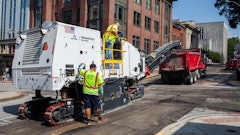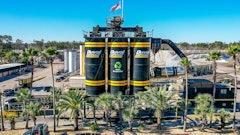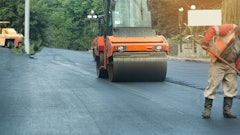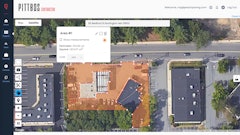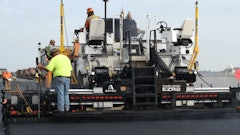
Good things come in small packages, right? Look no further than ever-evolving computer technology to see how a premium has been placed on getting more out of the smallest possible package.
For roadbuilding contractors, however, the bigger is better cliché historically has been very accurate. Highway projects involving miles of road and thousands of tons of asphalt have been the paving contractor's Holy Grail. With big money going hand in hand with larger assignments, there was little incentive for highway class paving contractors to pursue commercial paving jobs.
While the almighty dollar was the clear primary factor, the available equipment also had an influence on contractors' job preferences. Compact pavers were perceived as machines that lacked the speed and ability of a highway class paver. The quality of the machines satisfied the needs of commercial contractors but fell short of the performance expected by highway class contractors.
But times have changed. Although the passing of a new federal bill may help revive the highway paving business, the lack of funding over the past few years has resulted in inconsistent workloads spread among contractors. Conversely, the number of available commercial projects has risen due to the need for repairs to an aging urban infrastructure, as well as the continuing growth of suburbs and new businesses across the country.
In addition to the increased quantity of commercial jobs, the quality of compact pavers has also improved. Just 10 years ago, a compact paver could lay about 500 tons of asphalt per day. But thanks to a design incorporating thicker and heavier steel components, the productive effort of compact pavers has risen dramatically. Now those same classification machines can reach up to 1,500 tons in a day and provide a high-quality finish in the process.
Money, of course, still remains the key ingredient of any business. So paving contractors will only engage in work that results in high profits. What many larger contractors have discovered is that a compact paver is almost a necessity for new or changing areas of the paving business, and that investing in a compact paver will create the desired profits.
One size does not fit all
Commercial projects of every type have changed. No longer are parking lots composed purely of acres of unending asphalt. Parking lots are expected to be aesthetically pleasing, so trees, curbs, benches, resting areas and other obstacles are now scattered about to give a better overall appearance.
But with these added features come paving jobs that are more difficult to accomplish. Jobs that previously could have been successfully completed with a mainline paver now can be finished in half the time with compact pavers, which are better suited for the tight, twisted areas found on most commercial paving projects.
It doesn't stop at parking lots. Driveways leading up to homes in rural and suburban areas used to be long and straight. Today, the look of the driveway is nearly as important as the construction of the driveway itself. A common preference is for a driveway to be curved, and compact pavers, due to their maneuverability, lend themselves better to this type of job.
It's a commercial world
The growth of commercial paving can't be attributed to just one root cause. But if one had to be chosen, look no further than the aging infrastructure of American cities. The design life of infrastructure is being exceeded in most places. The requirements for water, gas and electricity are forcing the upgrade of old utilities or the installation of brand new utilities.
City streets have to be milled or torn up to accomplish a lot of this work. These jobs in turn create a lot of specialty paving projects, ranging from replacing torn up asphalt to paving trenches. Bringing in a mainline paver is rather impractical for a lot of these jobs, and in some cases mainline machines are just too big for the task. A compact paver provides the solution.
Compact pavers are also better suited to mill-and-fill operations and small overlays on streets. Narrow five-foot walking paths or cart paths on golf courses are also areas where a compact paver is the tool needed to get the job done. New housing subdivisions are going up constantly around the country, and require new driveways and streets. A compact paver is ideal for this work, since it can install all the driveways and then pave the subdivision road on the way out from the project.
Smaller jobs, bigger profits
The availability of commercial paving projects alone may not persuade a highway class contractor to immediately purchase a compact paver and start branching out to smaller jobs. But a closer look at the multitude of benefits associated with commercial paving may be enough to give those contractors the push they need to expand their business and start realizing greater profits.
For highway contractors that sometimes may have difficulty finding consistent work for their employees, adding a compact paver immediately provides contractors with another avenue of work to keep crews busy. This is also an important point for large contractors who make money by producing their own asphalt. Having more available jobs to complete means increased profits from asphalt production.
Working on commercial projects can yield financial benefits not just by the sheer quantity of jobs performed, but also on a per-job basis. In some cases, commercial jobs can pay three to five times per ton of asphalt more than a highway project. While the total asphalt tonnage on these smaller jobs can't compare to a roadbuilding project, the per-ton numbers are difficult to ignore. Compact pavers also require less handwork and thus a smaller crew — sometimes only five employees compared to 10 people working with a larger paver. This results in reduced labor costs.
The cost benefits don't end there. The transport costs involved with moving a paver from job to job are less with a smaller paver. The operation and maintenance costs for a compact paver sometimes only amount to a third of the cost of operating and maintaining a highway class paver. All of these factors contribute to a compact paver's ability to produce a quicker return on investment.
Extra benefits
Along with the potential for gains in profit, highway class contractors have other reasons to consider investing in a compact paver. With heavy highway work comes intense scrutiny from Department of Transportation (DOT) inspectors looking to make sure all the necessary road specifications are being attained. Certainly the right standards still need to be met on commercial projects, but the experience for a contractor can be far less stressful without an inspector constantly monitoring the job's progress. This also makes staying on schedule an easier feat to accomplish.
Compact pavers also allow large contractors to cover every aspect of the paving industry. As commercial paving continues to grow, the ability to diversify into a wider range of jobs is essential. Mainline pavers might be able to do some of this smaller work, but they certainly can't do it all. And they simply won't match the efficiency and cost-effectiveness of a compact paver on commercial jobs.
The value of versatility
Commercial paving is no longer a business that involves only small contractors. Commercial jobs have become so profitable that some large companies are now running fleets comprised solely of compact pavers. Highway class contractors shouldn't necessarily make any plans to abandon their primary business, but these contractors can grow and improve their business by adding a compact paver to their line of equipment.
Not only do compact pavers provide better capabilities for commercial paving jobs, but they also can be used in some areas of highway work. Most compact pavers now have electronic devices that allow them to meet state DOT specifications on shoulders, approaches and crossover ramps. Having a versatile machine on a large highway project gives contractors another tool and added options for completing a job.
The positive financial implications of owning and operating a compact paver are difficult to ignore. And with numerous commercial jobs there for the taking, a large contractor's decision to purchase a compact paver not only makes sense — it makes dollars and cents.
Information provided by John Hood, sales manager for paving and milling products, BOMAG Asphalt Products








